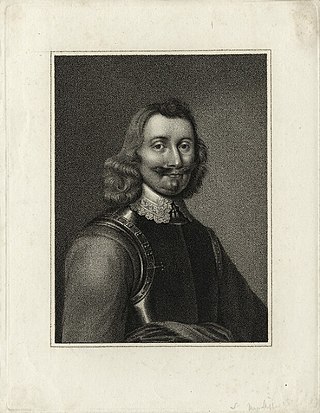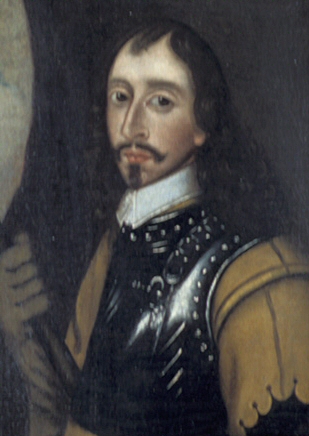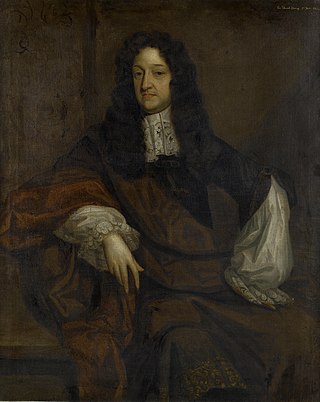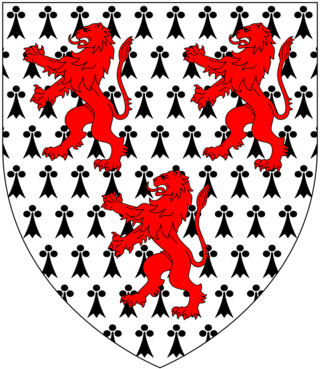Related Research Articles

Philip Skippon supported the Parliamentary cause during the English Civil War as a senior officer in the New Model Army. Prior to the war he fought in the religious wars on the continent. During the Interregnum he was a member of Parliament, an active soldier and on occasions a government administrator.

Colonel Adrian Scrope was a Parliamentarian soldier during the Wars of the Three Kingdoms, and one of those who signed the death warrant for Charles I in January 1649. Despite being promised immunity after the Restoration in 1660, he was condemned as a regicide and executed in October.

Sir Edward Massey, also spelt Massie, was an English soldier and politician from Cheshire, who sat in the House of Commons at various times between 1646 and 1674. He fought for Parliament in the First English Civil War, when he became famous for his defence of Gloucester. Although he remained loyal during the 1648 Second English Civil War, Massey switched sides following the Execution of Charles I in January 1649, and served under his son Charles II during the Anglo-Scottish war (1650–1652). Badly wounded at Worcester in September 1651, he was captured but managed to escape, and rejoin the exiled Stuart court in the Dutch Republic.

Sir Gilbert Pickering, 1st Baronet, 10 March 1611 to 17 October 1668, was a member of the landed gentry from Northamptonshire, and a religious Independent who supported Parliament in the Wars of the Three Kingdoms. An MP for Northamptonshire for most of the period from 1640 to 1660, during the 1649 to 1660 Interregnum he also served as Lord Chamberlain, sat on the English Council of State, and was appointed to Cromwell's Upper House in 1658.
Lostwithiel was a rotten borough in Cornwall which returned two Members of Parliament to the House of Commons in the English and later British Parliament from 1304 to 1832, when it was abolished by the Great Reform Act.

Sir Edward Dering, 2nd Baronet of Surrenden Dering, Pluckley, Kent was an English politician who sat in the House of Commons at various times between 1660 and 1674.
Sir Henry Mildmay was an English politician who sat in the House of Commons at various times between 1621 and 1659. He supported the Parliamentarian cause in the English Civil War and was one of the Regicides of Charles I of England.

Sir Thomas Jermyn (1573–1645) of Rushbrooke, Suffolk, was an English Royalist soldier and politician who was a Member of Parliament between 1604 and 1640. He became an influential courtier and served as Comptroller of the Household to Charles I from 1639 to 1641.
Sir Thomas Tyrrill was an English judge and politician who sat in the House of Commons in 1659 and 1660. He fought on the Parliamentarian side in the English Civil War.
Sir Richard Meredith, 2nd Baronet was an English politician who sat in the House of Commons from 1656 to 1659.
Sir Thomas Barnardiston, 1st Baronet was an English baronet, landowner, soldier and MP who sat in the House of Commons at various times between 1640 and 1659. He fought on the Parliamentary side in the English Civil War.
Herbert Morley was an English politician who sat in the House of Commons variously between 1640 and 1667. He fought for the Parliamentary army in the English Civil War. Later he was appointed Lieutenant of the Tower of London.
Sir John Merrick (1584–1659) was an English politician who sat in the House of Commons from 1640 to 1648. He fought in the Parliamentary army in the English Civil War.
Sir Walter Moyle was an English politician who sat in the House of Commons at various times between 1656 and 1660.
John Goodwin was an English lawyer and politician who sat in the House of Commons at various time between 1641 and 1660. He supported the Parliamentary cause in the English Civil War.
Sir Robert Goodwin was an English politician who sat in the House of Commons at various times between 1626 and 1659. He supported the Parliamentary cause in the English Civil War.
Francis St John was an English lawyer and politician who sat in the House of Commons at various times between 1654 and 1698.

Sir George Chudleigh, 1st Baronet, of Ashton, Devon, was an English landowner and politician, who sat in the House of Commons at various times between 1601 and 1625. He had close family connections to a group of Devon Presbyterians, including Sir William Strode.
Henry Mildmay was an English politician who sat in the House of Commons at various times between 1654 and 1692. He fought in the Parliamentary army in the English Civil War.
Roger James was an English landowner and politician who sat in the House of Commons at various times between 1661 and 1690.
References
- 1 2 3 4 Basil Duke Henning The House of Commons, 1660-1690
- ↑ "Clayton, John (CLTN638J)". A Cambridge Alumni Database. University of Cambridge.
- ↑ Willis, Browne (1750). Notitia Parliamentaria, Part II: A Series or Lists of the Representatives in the several Parliaments held from the Reformation 1541, to the Restoration 1660 ... London. pp. 229–239.
- ↑ Leigh Rayment's Historical List of MPs – Constituencies beginning with "L" (part 4)